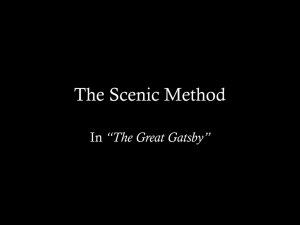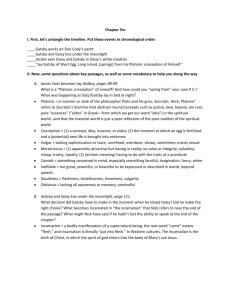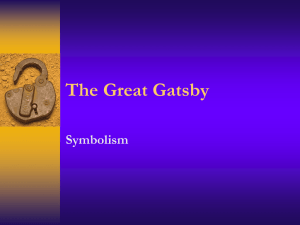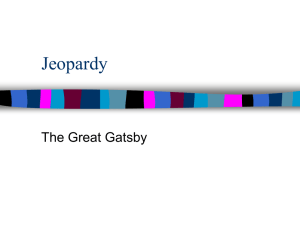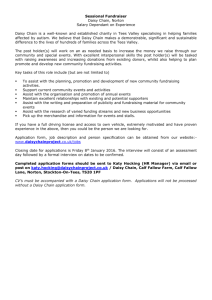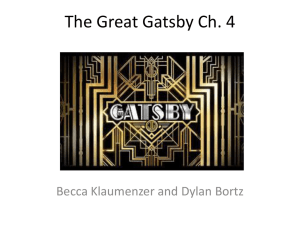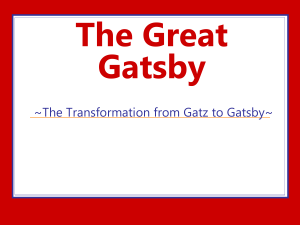File - Tatiana Rivas
advertisement
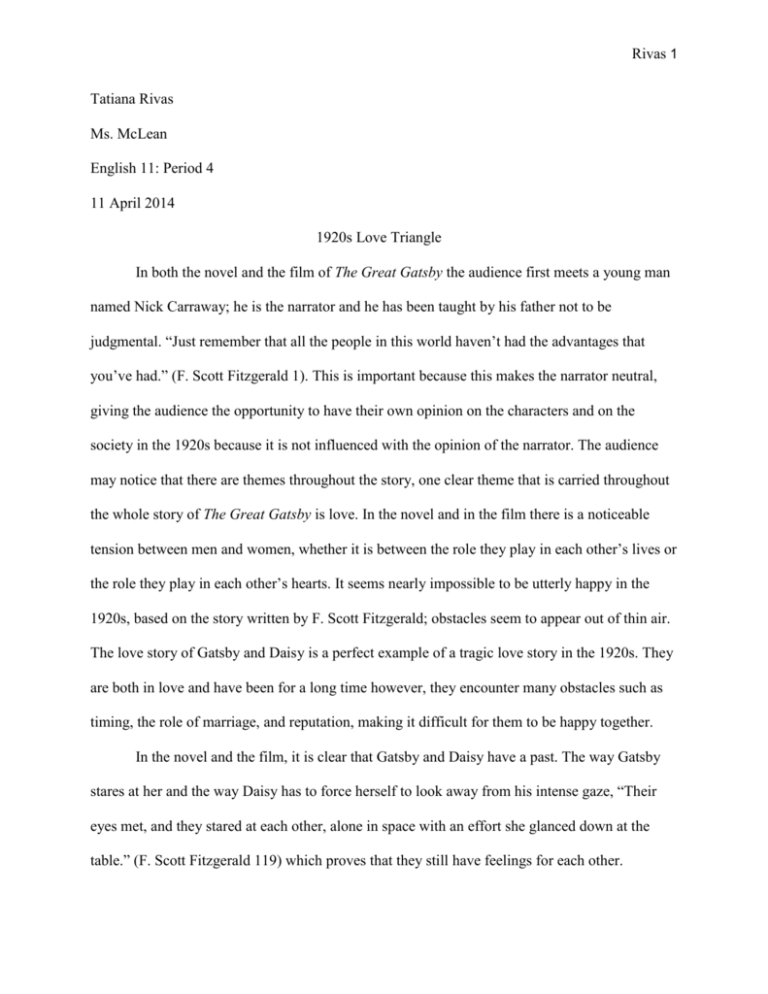
Rivas 1 Tatiana Rivas Ms. McLean English 11: Period 4 11 April 2014 1920s Love Triangle In both the novel and the film of The Great Gatsby the audience first meets a young man named Nick Carraway; he is the narrator and he has been taught by his father not to be judgmental. “Just remember that all the people in this world haven’t had the advantages that you’ve had.” (F. Scott Fitzgerald 1). This is important because this makes the narrator neutral, giving the audience the opportunity to have their own opinion on the characters and on the society in the 1920s because it is not influenced with the opinion of the narrator. The audience may notice that there are themes throughout the story, one clear theme that is carried throughout the whole story of The Great Gatsby is love. In the novel and in the film there is a noticeable tension between men and women, whether it is between the role they play in each other’s lives or the role they play in each other’s hearts. It seems nearly impossible to be utterly happy in the 1920s, based on the story written by F. Scott Fitzgerald; obstacles seem to appear out of thin air. The love story of Gatsby and Daisy is a perfect example of a tragic love story in the 1920s. They are both in love and have been for a long time however, they encounter many obstacles such as timing, the role of marriage, and reputation, making it difficult for them to be happy together. In the novel and the film, it is clear that Gatsby and Daisy have a past. The way Gatsby stares at her and the way Daisy has to force herself to look away from his intense gaze, “Their eyes met, and they stared at each other, alone in space with an effort she glanced down at the table.” (F. Scott Fitzgerald 119) which proves that they still have feelings for each other. Rivas 2 Although it has been years since they have seen each other they still feel the burning tension of their love, but sadly they can do nothing but hold on to the past. Daisy is a wealthy wife and mother; she cannot just leave her current life to be with her former lover Gatsby. Married couples in the 1920s may be unhappy and argue all the time based off of the fact that women did not have the same sense of equality as men, “I looked around. Most of the remaining women were now having fights with men said to be their husbands.” (F. Scott Fitzgerald 51), but they never get a divorce. Couples usually fight when women begin to act like an individual, men feel threatened and disapproves. The role women play in men’s lives is very vague however it is easy to see that women must be oblivious. Even though most couples are unhappy and do not wish to be together it is impossible to get a divorce because people in the 1920s were mostly caught up with their reputation of having a “perfect” life, specifically Daisy. Daisy was worried that if she would have left Tom for Gatsby people would have judged her. She cared more about her reputation of being an ideal women than her own happiness. That is why Daisy is torn between losing her true love or losing her current life, just like Daisy Tom also had a role, his role was to be a man and keep Daisy happy but he failed. The role Daisy had with Tom was very simple, she must keep her emotions, opinions quiet: in addition she must act as if her only purpose in life is to make Tom happy. Daisy was successful, putting her image before her happiness, must have hurt, having Gatsby so close but yet she still could not be free to love him. Daisy encounters plenty of situations where she has to bite her tongue because she knows that the outcome is not worth her breath. Daisy knows that in order to live as a successful woman in the 1920s it would be better off keeping quiet. Daisy once told Tom what she thought about the role women play in the life of men, “I’m glad it’s a girl. And I hope she’ll be a fool- that’s the best thing a girl can be in this world, a beautiful little fool.”(F. Scott Fitzgerald 17). In that Rivas 3 quote she is talking about her daughter, how she hopes that she is a fool, because if she is anything like her mother she will not live a happy life. If she is not a fool she will have to act like a fool hiding herself, making her thoughts and ideas useless just like Daisy. If she is a fool she can live life with no worries, she will have less on her mind making it easier to get along with the men of the 1920s. In the story there is a love triangle between Daisy, Gatsby, and Tom, which makes it difficult for the loving couple to live happily. Daisy is married to Tom but is in love with Gatsby, she is torn between the love of her life and the man who gives her a life. Daisy is forces stay with her husband, she will not be happy with him but if she were to leave him her reputation of being the ideal woman will disappear. Although Gatsby is as wealthy as Tom and she truly loves him, it is frowned upon to leave once you are married, especially if they have a child. She knows that she can never be free to be with whom she loves. In the quote above describes the way that Gatsby and daisy stare at each other, and the effort Daisy has to make to look away. It pains her that the man she loves if right in front of her and yet she cannot be free to love him. The story of The Great Gatsby in the film and in the novel have the common themes of love, it is portrait very well by the characters throughout the story. The way Daisy has to agree with Tom says simply because he is her husband, the way she stays in his life even though she is not in love with but feels as if she must stay with him rather than Gatsby. She feels pressured to stay with Tom because of marriage; back in the 1920s once you are together by the bond of married it is unbreakable. In the story men obviously are the stronger sex, they are in control of women. Love is something fictional in the world of the 1920s; you either have a wealthy life or have love, Unfortunately Daisy has been through all of this, she must decide to either be with Rivas 4 whom she loves or have the life she is use to having. Daisy chose Tom, she chose to have a lifestyle that she has had her entire life, the life of money, rather than being with Gatsby. Work Cited Fitzgerald, F. Scott. The Great Gatsby. New York : Charles Scribner's Sons, 1925. Print The Great Gatsby. Dir. Baz Luhrmann. Perf. Leonardo DiCaprio, Carey Mulligan, Tobey Rivas 5 Maguire, Joel Edgerton. Warner Bros Pictures, 2013. DVD

